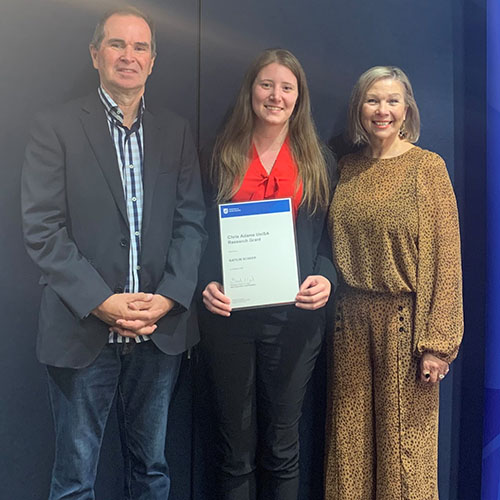01 April 2021

The family of a young man who lost his battle with brain cancer is financially supporting UniSA PhD candidate Kaitlin Scheer to help find a cure for the deadly disease.
Kaitlin has been awarded a $5000 Chris Adams Research Grant to develop a model which better predicts poor glioblastoma responders, allowing them to pursue different treatment options.
Chris Adams lost his battle in November 2015 after being diagnosed with a rare grade-three anaplastic astrocytoma brain tumour. His family is honouring his memory by supporting the Neurosurgical Research Foundation which funds vital research into brain cancer.
The funds will help Kaitlin undertake research at UniSA’s Centre for Cancer Biology into the complicated vascular properties of glioblastoma, the most aggressive form of brain cancer, including working with international researchers.
“Glioblastoma is particularly insidious as the blood vessels associated with these highly vascularised tumours support cancer growth and act as highways to facilitate invasion of tumour cells deeper into healthy brain tissue,” says Kaitlin.
“The model presents new opportunities for brain cancer research. It would be an invaluable tool to better understand how drugs and immune cells infiltrate the tumour and modulate the tumour microenvironment.
“This is essential for the design of new therapies, including small molecule drug-inhibitors, combination therapy, and immunotherapy.”
Thanks to the Chris Adams UniSA Research Grant, Kaitlin will visit and collaborate with the United States-based industry company Advanced Solutions, who are experts in the area. This experience will allow her to learn, first-hand, cutting-edge tissue engineering technologies that are not yet available in Australia.
The grant will also allow Kaitlin to attend the 13th Cooperative Trials Group for Neuro-Oncology (COGNO) Annual Scientific Meeting in Melbourne later this year, connecting with, and gaining insight from, other oncologists and brain cancer researchers.
“I firmly believe that close interactions between oncologists, clinicians and laboratory are the key to unravelling the complexities of brain cancer and ensuring that research undertaken continues to be relevant and patient-driven,” she says.
“The insights I will gain from the conference, combined with new skills from working with Advanced Solutions, will support my goal of developing a powerful tool for brain cancer research, with the ultimate goal of improving treatment for patients.”
For more information on the grant visit: www.unisa.edu.au/Research/Research-degrees/Scholarships/Chris-Adams-UniSA-Research-Grant.
To find out more about the NeuroSurgical Research Foundation please visit: www.nrf.com.au.




